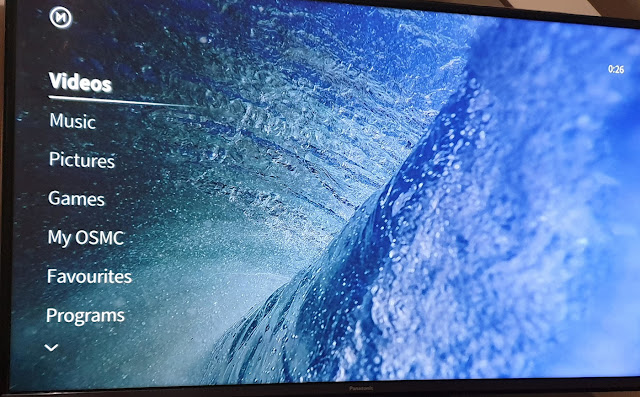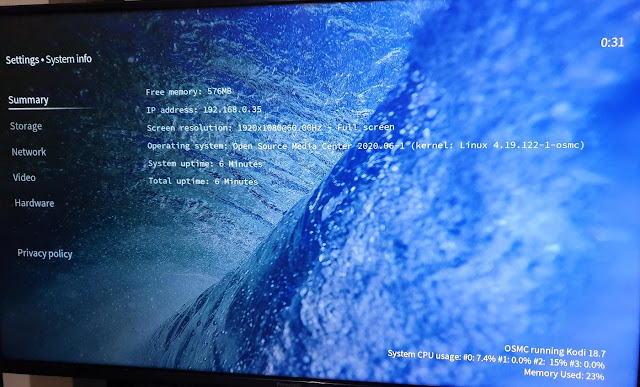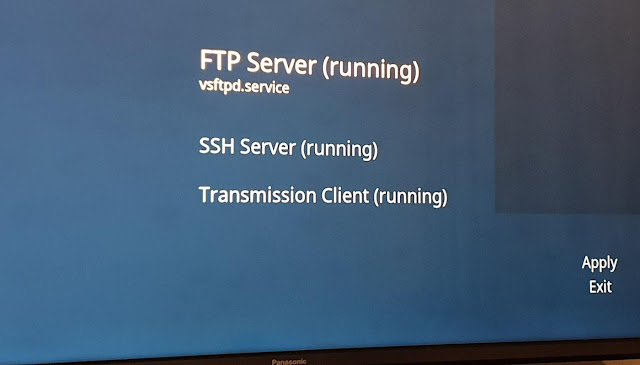OSMC is another specialist operating system whose aim it is to provide just enough an environment to run Kodi. As such Kodi is the only graphical interface you get and not only its own settings but also all system configuration options have to be accessible through the Kodi interface.
The web site claims that "OSMC can play all major media formats out there and supports a variety of sharing protocols so you’re guaranteed to be able to stream from other devices. OSMC can stream media and serve files to other devices as well!"
The media center being extremely themeable, OSMC in its current iteration has a refreshed and really nice looking but still functional skin that I wished would be available as a free version for general download but it seems the main developer is guarding his logo and distiguishing features jealously so this may not be possible.
 |
| The main screen |
The website features a blog where announcements are made, an about page that explains the OSMC project in more detail, a download section, a Wiki with FAQs and and a long list of useful articles like installing packages with apt (which would have to be done via ssh), a store and a link to the community support forum on Discourse. It appears the store is quite central to the project, the Vero device is heavily pushed there and on the front page. This together with the trademark issue may be enough to turn geeks looking for a free software solution off as it all quickly feels a tad too commercial. These people will be better off with LibreELEC. The two projects are quite similar in that, apart from giving us a cut-down Kodi OS, both are also based on Debian.
The distribution is available for the Raspberry Pi, Vero and Apple TV, as well as for Windows and OS X. The current version for the Pi from version 2 upwards is 2020.06-1 which was apparently released 07th June 2020. For ease of installation I downloaded and installed this via Noobs which I had written to an SD card before. The image directly from the website is 230.5 MB. All in all I fared a lot better than a previous reviewer. The system has matured a lot and works well, but then seven years have passed since so you would expect some progress.
Once the system has booted up from SD card we are presented with a streamlined setup routine that walks us through configuring the device. We can choose language and keyboard layout, enable ssh access and configure the network. Ssh is kind of necessary if you want to update the system from within without reinstalling every release or to add packages as there is no graphical package manager. It is also needed to add the VPN manager for OpenVPN plugin for Kodi which is not in any repository with wget.
Log in to your OSMC with ssh (username: osmc; password: osmc) and issue
wget https://github.com/Zomboided/repository.zomboided.plugins/releases/download/1.0.0/repository.zomboided.plugins-1.0.0.zip
You can then install this repository from the file manager like any other and add the plugin from here (see instructions). The advantage of this plugin is that it has a huge pre-populated list of VPN providers and their locations which you can easily switch within the app.
OpenVPN needs to be installed first with „apt-get install openvpn“ as unlike LibreELEC it is not part of OSMC by default.
Unfortunately despite doing this and OpenVPN being up and running the VPN plugin did not connect for me. Odd, as OSMC like its cousin is based on Debian Buster. This points to some other underlying incompatibility in OSMC with the VPN manager plugin. I'm not willing to troubleshoot this when there's another solution that works equally well and better in this case but there are other, more traditional OpenVPN plugins for Kodi around like this one that let you import configurations if you really want to stay with OSMC.
If you got yourself a remote like this one it's easy and fluid to navigate around the interface once everything has been set up and your plugins imported or set up from the media repositories. The choice of add-ons in the included repo is not great and probably not enough to satisfy most users. If you thought OSMC might distribute more than just some of the basic free add-ons from the Kodi repository you will be disappointed. Not even the BBC iplayer. Ok, that one is broken anyway. If you're serious about streaming you'll have to install your own but with ever more websites like the BBC breaking plugins with redesigns on purpose and Youtube requiring an API key to stream the future might lie in the browser. And the official TV/Android apps.
 |
| System info: 576 MB memory free does not equal 23% used. Perhaps Kodi does not see the underlying Debian system? |
The skin gives you access to the usual entries for Videos, Music, Pictures etc. on the left, plus an entry for My OSMC which can also be accessed under Programs. You also get the Weather forecast. Kodi settings are accessed under Settings, not under OSMC. Lastly the Poweroff button at the bottom opens a menu with the usual entries. Apart from the OSMC section this is stock Kodi under the hood with an icy glacier theme.
 |
| System settings screen |
The OSMC section is however the most interesting. The cart icon leads to a sort of app store where one can install an FTP server, Transmission, Samba, a task scheduler and something called TVHeadend server. These can then be managed under services, accessible from the gear icon.
 |
| Managing running services on OSMC |
You can also view logs and further manage network and Bluetooth connections here or turn the device into a wireless hotspot, set memory limits for various Pi models and enter MPEG 2 and WVC1 licenses should you have purchased one, for example from Fluendo.
Conclusion
OSMC strikes me as the more commercial offering. In general it worked well and has a lot to offer like additional options to import licenses to enable DRM and more efficient decoding. It streamed media through my chosen movie plugins just as well as any Kodi install. It used slightly more RAM than LibreELEC, around 30 MB more, but still ran comfortably even on a 3A+ with 512 MB with smooth playback, fluid navigation and RAM to spare.
Unfortunately VPN manager did not work which is kind of crucial if you want to watch anything from the netz, i.e. not just from your local home network, or if you employ one of the bittorrent plugins.
Unless you don't have a need for this or you drop for OSMC because you like the theme better or need one of its unique features I would recommend going for LibreELEC until this is solved. They both do the same thing but LibreELEC works a bit better and is more open.

No comments:
Post a Comment
Please leave your comment here. Spam will be deleted.
Note: only a member of this blog may post a comment.